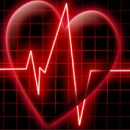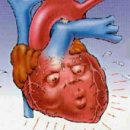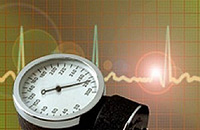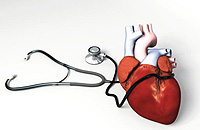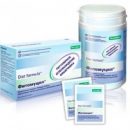What is the treatment of ischemic heart disease begins? With changes in lifestyle, fighting bad habits. Consider what prevents and slows down the course of the disease.
Content
CHRS treatment, as well as its diagnostics, involves the joint work of the cardiologist and the patient at once in several directions. First of all, it is necessary to take care of changing the style of life and on the impact on the risk factors IBS. In addition, drug treatment is appointed, and if necessary, endovascular and surgical treatment methods are used.
Change lifestyle
Changing the style of life and neutralization of risk factors include the obligatory refusal of smoking, correction of cholesterol levels (with a diet or drugs), a decrease in body weight. Patients of IBS recommended the so-called «Mediterranean diet», which includes vegetables, fruits, light dishes from birds, fish and seafood. A very important point of non-drug treatment of IBS is the struggle with a sedentary way of life by increasing the physical activity of the patient. Of course, an indispensable condition for the successful treatment of IBS is pre-treatment from hypertension or diabetes, if the development of IBS occurs against the background of these diseases.
Medical treatment of IBS
Drug treatment of IBS is directed for the most part to eliminate signs of angina. The objectives of the treatment of ischemic heart disease are defined as an improvement in the quality of life of the patient, that is, a decrease in the severity of symptoms, preventing the development of such forms of IBS, as a myocardial infarction, unstable angina, sudden heart death, as well as an increase in the life expectancy of the patient.
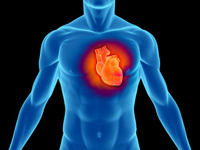 Initial relief attack of angina is carried out using nitroglycerin with vasodilatory action. The rest of the drug treatment of ischemic heart disease is prescribed only a cardiologist based on the objective picture of the disease. Among the drugs that are used in the treatment of IBS, drugs can be distinguished by drugs that contribute to a decrease in the need of myocardium in oxygen, an increase in the volume of the coronary channel and T.D. However, the main task in the treatment of IBS – Release overcell vessels – With the help of medicines is practically not solved (in particular, sclerotic plaques are practically not destroyed by medicines). In serious cases, the operation will be required.
Initial relief attack of angina is carried out using nitroglycerin with vasodilatory action. The rest of the drug treatment of ischemic heart disease is prescribed only a cardiologist based on the objective picture of the disease. Among the drugs that are used in the treatment of IBS, drugs can be distinguished by drugs that contribute to a decrease in the need of myocardium in oxygen, an increase in the volume of the coronary channel and T.D. However, the main task in the treatment of IBS – Release overcell vessels – With the help of medicines is practically not solved (in particular, sclerotic plaques are practically not destroyed by medicines). In serious cases, the operation will be required.
Aspirin was considered a classic tool in the classic agent for many years, many cardiologists even recommend to apply it prophylactically in small quantities (half / one fourth children's dose per day), but in recent years, new drugs are being developed that can replace it in action, and at the same time possessing Smaller side effects.
The modern level of cardiology has a diverse arsenal of medicines aimed at treating various forms of IBS. However, we will recall once again that any medicines can only be prescribed a cardiologist and can only be applied under the control of the doctor. Many of the potent drugs used for self-medication are able to cause patients with such serious side effects that will need immediate medical correction.
Coronary shunting
For more severe cases, IBS uses surgical treatment methods. Pretty good results shows coronary shunting, when the plaque is blocked or a thrombus of the artery is replaced «Artificial vessel», which takes over blood flow. However, the complexity of the operation itself sometimes overlaps the effect of it. These operations are almost always performed on a non-working heart in artificial blood circulation, after shunting the patient accounts for a long time to restore from the extensive operating injury, which also makes it difficult to re-operation, if necessary. The shunting method has a lot of contraindications, especially in patients with a weakened organism, but with successful operations, the results are usually good.
Endovascular Surgery
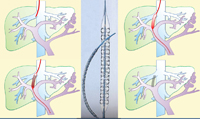 Endovascular surgery (X-ray rich surgery, interventional radiology) is currently considered the most promising method of treating IHD. Term «endovascular» translated as «inside the vessel», which very accurately reflects the specifics of this treatment method. This is a relatively young direction of medicine has already gained strong position in the treatment of IBS. All interventions are carried out without cuts, through punctures in the skin, under X-ray observation, for the operation of a fairly local anesthesia. All of these features are the most important, for which, due to the concomitant diseases, or due to the overall weakening of the body, traditional surgical intervention is contraindicated.
Endovascular surgery (X-ray rich surgery, interventional radiology) is currently considered the most promising method of treating IHD. Term «endovascular» translated as «inside the vessel», which very accurately reflects the specifics of this treatment method. This is a relatively young direction of medicine has already gained strong position in the treatment of IBS. All interventions are carried out without cuts, through punctures in the skin, under X-ray observation, for the operation of a fairly local anesthesia. All of these features are the most important, for which, due to the concomitant diseases, or due to the overall weakening of the body, traditional surgical intervention is contraindicated.
Balloon angioplasty and stenting
From the methods of endovascular surgery, the CHA is most often used balloon angioplasty and stenting, which allow you to restore the permeability in the arteries affected by ischemia. When using balloon angioplasty, a special cylinder is introduced into the vessel, and then he is swollen and "Move" At the sides atherosclerotic plaques or blood clots. After that, the so-called stent is introduced into the artery – Mesh tubular frame from «medical» stainless steel or alloys of biologically inert metals capable of independently expanding and maintaining a given vessel shape.
Studies have shown that after surgical or endovascular treatment, the risk of complications are small, and the positive effect of treatment is stable and long. In compliance with the patients with the recommendations of the cardiologist relating to the lifestyle and reduce the influence of the risk factors, the CHD, the probability of a full, not oversted threat of severe complications, the patient's life is very large.

